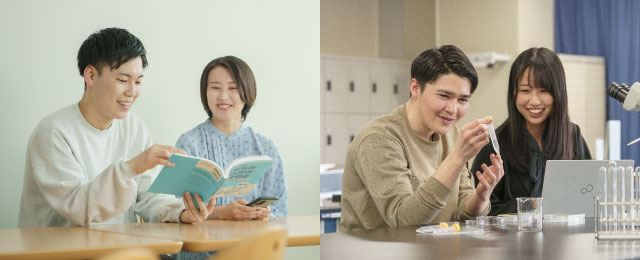







Home > Admissions > Admission Policy > Faculty of Education, Art and Science
The Faculty of Education was reorganized into the Faculty of Education, Art and Science in April 2005 in order to instill students with practical expertise for the 21st century. It created the Department of Education, the Department of Art and Culture and the Department of Information, Environment and Food Science, which had contributed to regional society's education and culture, the fostering of teachers and the creation of cultural activities and lifestyles.
As generations progress, society has undergone a sea change to require different types of workers. To cope with the change, the three departments were unified into a single department (the Department of Education, Art and Science). As a faculty with expert courses and a practical and comprehensive education system, the Faculty of Education, Art and Science aims at fostering human resources suited to the needs of the new age.
The advancement of globalization and information society in line with the rapid progress of science and technology, and significant changes of the social environment, as represented by the falling birthrates and graying of the population, call for the creation of a comprehensive power of the community to address these situations.
The faculty nurtures citizens and professionals capable of linking their expert knowledge to practice, carry on, and further develop cultural resources of the community.
In order to further promote the cultivation of expert professionals who can contribute to energizing local areas and the development of people with a high degree of expertise combined with a comprehensive knowledge and practical abilities, the Department of Education, Art and Science provides eight courses and 23 programs to better suit the needs of students.
The department's curriculum consists of basic education for the acquisition of liberal arts knowledge, core programs for the basics of specialties, and advanced programs to acquire a high level of expertise.
It also provides opportunities for interdisciplinary learning to enable the acquisition of comprehensive and applied skills.
The eight courses are outlined below:
The course fosters elementary school teachers with a high degree of content area knowledge who can appropriately cope with today's complex and varied school problems. It also nurtures special education teachers who teach and support handicapped children, and certified psychologists with a teaching certificate for elementary schools that can give psychological support in the educational environment and other areas.
The course develops indivisuals who can contribute to the community's intercultural exchange, especially with East Asian residents and English-speaking citizens, by taking advantage of their language and cultural knowledge and communication skills. Students will be able to acquire a practical command of English, Chinese or Korean and Japanese teaching skills for the promotion of intercultural exchange. The program also fosters well-cultured Japanese and English teachers with a practical command of the languages and internationally minded social studies teachers for junior high and high schools with a deep understanding of today's interconnected international society.
The Art Course fosters people who can take leadership in contributing to the promotion of the community's formative arts activities. Students can use their power of expression in art, design, and art theory in the real world. The course of study also develops junior high and high school teachers of arts and crafts equipped with a wide range of knowledge and culture, creative and practical expression skills, and a confident ability to develop teaching materials.
Students of the course study both practical skills and theory in order to gain the ability to support and lead the improvement of applied musical activities in the community. Through teacher training courses, students will become qualified to teach music culture at junior high and high schools.
The course fosters people who can support and teach health and sports activities, including the planning of appropriate opportunities to learn sports in accordance with individual needs. The program also nurtures well-cultured health and physical education teachers for junior high and high schools with informed scientific views on sports.
The course develops people who can address nutritional issues with deep wisdom, and contribute to the improvement of dietary life and the creation of food culture. The curriculum also trains nutritionists with broad expert knowledge, nutrition educators and teachers of domestic science. Students will systematically study nutrition science, food science, nutrition education and other disciplines concerning food to acquire a high level of expertise and practical skills based on scientific foundations.
The course is designed to foster people who can understand the various characteristics of the natural environment and build a living space where people can lead rich lives. With a basic knowledge and understanding of natural sciences, students will acquire expert knowledge needed to create a sustainable harmony of dwellings and the natural environment and a space for a safe, secure, and comfortable human life.
The course supports learners who are capable of solving complex problems encountered in modern society by linking various academic fields and proposing better systems. It also fosters junior high and high school mathematics teachers equipped with a deep understanding of problem-solving methods based on mathematical sciences.